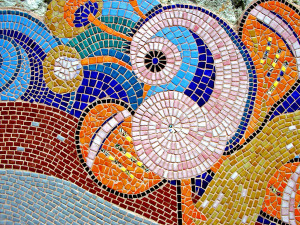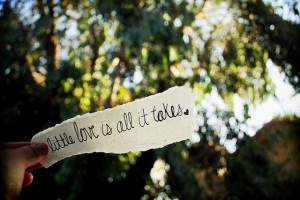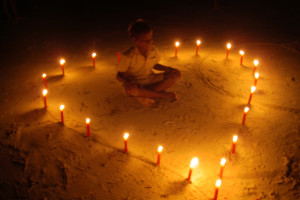What Justice Looks Like
May 2, 2016Sometimes, it is tempting to think about justice only as something “out there,” something that is about causes and actions and social change. But justice is also about how we treat ourselves and the people around us and in our families. The way we treat people individually has a big impact on those larger issues, even if it’s hard to tell right away.
Dr. Cornel West tells us, “Justice is what love looks like in public.” You can tell yourself this quote too, to remind you of why justice is so important. When we work for justice, we are embodying love in our communities; this is how we change the world!
Beautiful and Broken
March 1, 2016A mosaic is a kind of artwork that is made by creating a picture out of pieces of pottery. It’s a way that something broken can turn into something beautiful.
One way to play with the idea of a mosaic is to draw an abstract picture, full of color and shapes, but not necessarily of a particular thing like a cat or a robot. Then cut the picture up. Break it on purpose. Then glue the pieces onto a piece of construction paper, leaving just a little gap between each piece.
You will create a new, and maybe surprising, piece of art by taking the original drawing apart and putting it back together in a different form.
An Invitation Song
February 1, 2016Here is a fun and lively song that’s perfect for getting excited about something new. Perhaps you could sing it in the morning, whether it’s the start of a new day–or the start of the weekend! The first verse says, “Enter, rejoice and come in!” This is a great invitation to extend to people, to ideas, and to new experiences.
What would you like to invite into your life? To whom will you extend a welcome today?
Wishing for Something New
January 1, 2016Many people make resolutions for the New Year of things that they plan to do differently. And many people break those resolutions before the week is out because they didn’t really want to make those changes to begin with. So it helps to start with a resolution that you DO want, not that you think you SHOULD want.
What is one thing that you really, really hope is part of your year to come? Write it down and put it in a jacket pocket. Now you have the year to figure out how to make your wish come true.
Hopes for the Day
December 1, 2015Setting intentions is a way of practicing mindfulness by focusing on the kind of day, week, year or life you’d like to have, and visualizing the actions you can take to achieve your hopes. It’s a practice that can work for adults, teens and children alike.
If you have time as a family to gather in the morning, take turns sharing your intentions for the day. You could even light a candle or write down your intentions together on a chalkboard or paper, or construct a family ritual of your own. (If time in the morning is stretched thin, you could also take time during the evening or bedtime the night before.)
Children will likely need some help learning this new practice. A good question to begin with is, “What good do you want to invite into your life today?” You can suggest some general feelings that a child might understand and hope to experience: love, peace, joy, fun, safety and success are all good starters.
Brainstorm with children to come up with concrete ways they could experience these feelings during the day, such as “I want to invite success into my life by acing my math test,” or “I want to experience fun by playing with my friends at recess, or “I want to invite peace into my world by talking to kids at school that look lonely.” Yoga Chicago offers some other great suggestions for setting intentions with children that apply well for all ages.
Lastly, visualize these things happening: sitting down to take the math test and knowing all the answers, being a good friend to classmates so that you can enjoy fun together at recess, being mindful of which classmates could use a friendly ear, and striking up conversation. (Visualizing your hopes for the day is also a great meditative exercise for adults, too!)
For additional ideas for setting intentions for yourself or for your family, visit Playful Planet’s website.
A Forgiveness Ritual
September 2, 2015Rev. Rob Eller-Isaacs wrote a ritual of forgiveness for Unitarian Universalists, based on the Jewish Yom Kippur service. In this ritual, everyone repeats: “I forgive myself and I forgive you. We begin again in love.”
When someone hurts us, or we hurt others, the goal is not only that the person who was hurt forgives, we also need to forgive ourselves, and to start over in love. For those times when someone hurts you, or you hurt someone else, you might want to keep this in your pocket: “I forgive myself and I forgive you. We begin again in love.”
“Stars,” by Namoli Brennet
July 1, 2015“Stars,” by Namoli Brennet
Lyrics:
Maybe we’re just one of a million tiny galaxies
Hurtling on towards some unrevealed destiny
Maybe we’re somebody’s unfinished symphony
Maybe we’re the defenders of the indefensible
Just trying to make sense of the incomprehensible
And what if we, what if we are
What if we, what if we are
Stars
Maybe we’re the victims of reincarnation
Maybe we’re the phantoms of manifestation
Maybe we’re just here to fix our mistakes again
Maybe we’re planets like Venus and Saturn
Surrounded by gases and protons and atoms
And what if we, what if we are
What if we, what if we are
Only stars
Maybe this world is just thinner than it seems
Maybe we’re all partners in the same lucid dream, yeah
Well maybe we’re vapors, and maybe we’re just steam
Maybe we’re creatures of habit and malice
That pale in the light of aurora borealis
And what if we, what if we are
What if we, what if we are
Only stars
Only stars
in the dark
just a
spark
Maybe we’re just lucky and blest to bear witness
to the flashing of this meteor, the tale of this comet
Maybe we’re cursed, and maybe we’re fortunate
Maybe we just go on our milky white way
Maybe we get to stay
And what if we, what if we are
What if we, what if we are
Stars
From the album Chrysanthemum, available here for download.
Renew Your Membership
We invite you to join your fellow CLFers to renew your CLF membership and stewardship of the CLF for another year.
Support the CLF
Can you give $5 or more to sustain the ministries of the Church of the Larger Fellowship?
Newsletter Signup
About
Quest for Meaning is a program of the Church of the Larger Fellowship (CLF).
As a Unitarian Universalist congregation with no geographical boundary, the CLF creates global spiritual community, rooted in profound love, which cultivates wonder, imagination, and the courage to act.
Contact
Church of the Larger Fellowship Unitarian Universalist (CLFUU)
24 Farnsworth Street
Boston MA 02210




Here is a blessing to offer anyone who is heading out on a journey–even if that journey is just as far as school.
May you go out in peace and may you come back in joy. On the road in between, may you find what fills your heart, feeds your mind and inspires your imagination.
Artist: Alice Popkorn